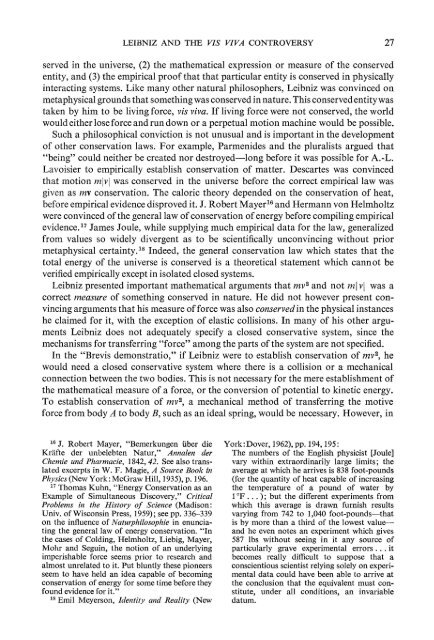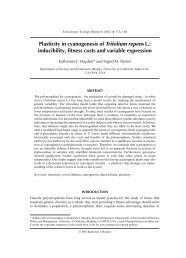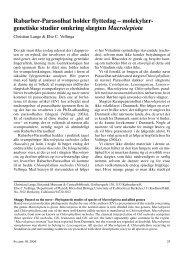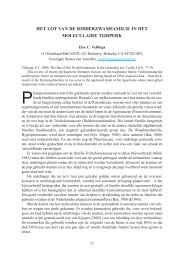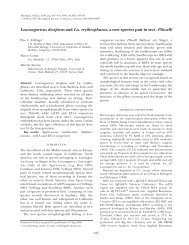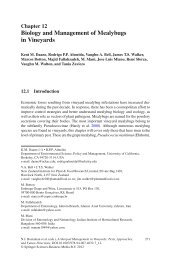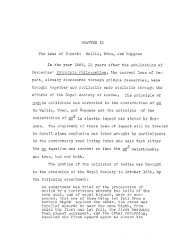Leibniz and the Vis Viva Controversy
Leibniz and the Vis Viva Controversy
Leibniz and the Vis Viva Controversy
Create successful ePaper yourself
Turn your PDF publications into a flip-book with our unique Google optimized e-Paper software.
LEIBNIZ AND THE VIS VIVA CONTROVERSY 27<br />
served in <strong>the</strong> universe, (2) <strong>the</strong> ma<strong>the</strong>matical expression or measure of <strong>the</strong> conserved<br />
entity, <strong>and</strong> (3) <strong>the</strong> empirical proof that that particular entity is conserved in physically<br />
interacting systems. Like many o<strong>the</strong>r natural philosophers, <strong>Leibniz</strong> was convinced on<br />
metaphysical grounds that something was conserved in nature. This conserved entity was<br />
taken by him to be living force, vis viva. If living force were not conserved, <strong>the</strong> world<br />
would ei<strong>the</strong>r lose force <strong>and</strong> run down or a perpetual motion machine would be possible.<br />
Such a philosophical conviction is not unusual <strong>and</strong> is important in <strong>the</strong> development<br />
of o<strong>the</strong>r conservation laws. For example, Parmenides <strong>and</strong> <strong>the</strong> pluralists argued that<br />
"being" could nei<strong>the</strong>r be created nor destroyed-long before it was possible for A.-L.<br />
Lavoisier to empirically establish conservation of matter. Descartes was convinced<br />
that motion mlvl was conserved in <strong>the</strong> universe before <strong>the</strong> correct empirical law was<br />
given as mv conservation. The caloric <strong>the</strong>ory depended on <strong>the</strong> conservation of heat,<br />
before empirical evidence disproved it. J. Robert Mayer16 <strong>and</strong> Hermann von Helmholtz<br />
were convinced of <strong>the</strong> general law of conservation of energy before compiling empirical<br />
evidence.7 James Joule, while supplying much empirical data for <strong>the</strong> law, generalized<br />
from values so widely divergent as to be scientifically unconvincing without prior<br />
metaphysical certainty.18 Indeed, <strong>the</strong> general conservation law which states that <strong>the</strong><br />
total energy of <strong>the</strong> universe is conserved is a <strong>the</strong>oretical statement which cannot be<br />
verified empirically except in isolated closed systems.<br />
<strong>Leibniz</strong> presented important ma<strong>the</strong>matical arguments that mV2 <strong>and</strong> not mj vl was a<br />
correct measure of something conserved in nature. He did not however present convincing<br />
arguments that his measure of force was also conserved in <strong>the</strong> physical instances<br />
he claimed for it, with <strong>the</strong> exception of elastic collisions. In many of his o<strong>the</strong>r arguments<br />
<strong>Leibniz</strong> does not adequately specify a closed conservative system, since <strong>the</strong><br />
mechanisms for transferring "force" among <strong>the</strong> parts of <strong>the</strong> system are not specified.<br />
In <strong>the</strong> "Brevis demonstratio," if <strong>Leibniz</strong> were to establish conservation of mV2, he<br />
would need a closed conservative system where <strong>the</strong>re is a collision or a mechanical<br />
connection between <strong>the</strong> two bodies. This is not necessary for <strong>the</strong> mere establishment of<br />
<strong>the</strong> ma<strong>the</strong>matical measure of a force, or <strong>the</strong> conversion of potential to kinetic energy.<br />
To establish conservation of MV2, a mechanical method of transferring <strong>the</strong> motive<br />
force from body A to body B, such as an ideal spring, would be necessary. However, in<br />
16J. Robert Mayer, "Bemerkungen uiber die<br />
Kraifte der unbelebten Natur," Annalen der<br />
Chemie <strong>and</strong> Pharmacie, 1842, 42. See also translated<br />
excerpts in W. F. Magie, A Source Book in<br />
Physics (New York: McGraw Hill, 1935), p. 196.<br />
17 Thomas Kuhn, "Energy Conservation as an<br />
Example of Simultaneous Discovery," Critical<br />
Problems in <strong>the</strong> History of Science (Madison:<br />
Univ. of Wisconsin Press, 1959); see pp. 336-339<br />
on <strong>the</strong> influence of Naturphilosophie in enunciating<br />
<strong>the</strong> general law of energy conservation. "In<br />
<strong>the</strong> cases of Colding, Helmholtz, Liebig, Mayer,<br />
Mohr <strong>and</strong> Seguin, <strong>the</strong> notion of an underlying<br />
imperishable force seems prior to research <strong>and</strong><br />
almost unrelated to it. Put bluntly <strong>the</strong>se pioneers<br />
seem to have held an idea capable of becoming<br />
conservation of energy for some time before <strong>the</strong>y<br />
found evidence for it."<br />
"I Emil Meyerson, Identity <strong>and</strong> Reality (New<br />
York:Dover, 1962), pp. 194, 195:<br />
The numbers of <strong>the</strong> English physicist [Joulel<br />
vary within extraordinarily large limits; <strong>the</strong><br />
average at which he arrives is 838 foot-pounds<br />
(for <strong>the</strong> quantity of heat capable of increasing<br />
<strong>the</strong> temperature of a pound of water by<br />
1?F ... ); but <strong>the</strong> different experiments from<br />
which this average is drawn furnish results<br />
varying from 742 to 1,040 foot-pounds-that<br />
is by more than a third of <strong>the</strong> lowest value-<br />
<strong>and</strong> he even notes an experiment which gives<br />
587 lbs without seeing in it any source of<br />
particularly grave experimental errors .. . it<br />
becomes really difficult to suppose that a<br />
conscientious scientist relying solely on experi-<br />
mental data could have been able to arrive at<br />
<strong>the</strong> conclusion that <strong>the</strong> equivalent must con-<br />
stitute, under all conditions, an invariable<br />
datum.


